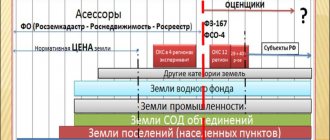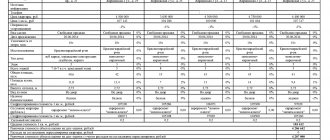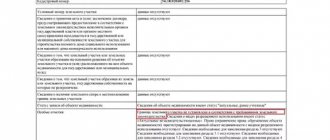Law No. 269-FZ
On July 31, 2021, an important law was adopted, which also has implications for property tax payers.
This is Federal Law No. 269-FZ. It makes changes to the rules for applying and challenging cadastral value. In connection with the changes, the accountant needs to pay attention to:
- frequency of state cadastral valuation;
- the possibility of retrospective application of cadastral value;
- procedure for correcting errors when determining cadastral value.
Frequency of cadastral valuation
The frequency of the state cadastral assessment has been established. The next assessment will be carried out 4 years from the year of the last assessment, and in cities of federal significance - by decision of the mayor - after 2 years.
This frequency will begin to apply:
- for land plots - from January 1, 2022;
- for real estate (buildings, premises, structures, unfinished construction projects, parking spaces) - from January 1, 2023.
It has been established that an extraordinary cadastral assessment will be carried out:
- in 2022 - land plots;
- in 2023 - buildings, premises, structures, unfinished construction projects, parking spaces.
Until then, the previous frequency of cadastral valuation remains the same.
Application of cadastral value
A rule has been established on the retrospective application of the cadastral value of a property in taxation. If the correction of an error made in determining the cadastral value led to its decrease, then the new value will be extended to the entire period from the date the information on the cadastral value began to be applied.
If the cadastral value increases, its new value will be applied starting next year.
And if there are several cadastral values applied at one point in time, determined for one date, the lowest of them is applied - according to the law on valuation activities.
Read in the berator “Practical Encyclopedia of an Accountant”
Adjustment of the tax base determined based on the cadastral value in 2021
Required Documentation
For the Commission under the Ministry of Property Relations of the Moscow Region:
- application for revaluation of the object;
- a document indicating the status of the owner;
- cadastral passport;
- documentation that confirms the validity of the claims;
- a report from an independent appraiser and a conclusion that the report complies with the legislation of the Russian Federation.
Changing the cadastral value of real estate in court begins with drawing up a statement of claim. The complete list of documentation that needs to be prepared looks like this:
- statement of claim;
- document confirming the owner's status;
- cadastral passport;
- market value assessment report;
- document confirming payment of state duty.
A conclusion on compliance with the law is not necessary; the court will personally examine the paper. You can go to court without a report, but then you will have to wait for the results of an expert assessment appointed by the judge, and this can take months.
Error correction
From January 1, 2021, an application to correct errors made in determining the cadastral value can be submitted within 5 years from the date of entering information about the cadastral value into the Unified State Register of Real Estate.
If the application for correction of errors is accepted, the cadastral value is recalculated due to errors made in determining the cadastral value, the budgetary institution is obliged to check whether the identified error was made in relation to other real estate objects, including neighboring, adjacent, similar ones.
If errors are identified, their cadastral value is also recalculated.
SRG in the media
A. Zyablov, Director of the Legal Support Department of the IPT Real Estate Administration: - In 2021, there are indeed many changes in the legislation on cadastral value. Firstly, from January 1, 2021, the amendments introduced by the Federal Law of August 3, 2021 No. 334-FZ “On Amendments to Article 52 of Part One and Part Two of the Tax Code of the Russian Federation” in paragraph 15 of Art. . 378.2, clause 1.1 art. 391 and paragraph 2 of Art. 403 of the Tax Code of the Russian Federation. This law corrects the procedure for applying for tax purposes the cadastral value changed by a court or commission as a result of challenging the cadastral value. If previously the cadastral value changed during a dispute was applied for tax purposes from January 1 of the current year, then in accordance with the new rules, changes in the cadastral value will be taken into account from the date of commencement of its application. Exactly the same rules are established for changes in cadastral value associated with the correction of technical errors. But changes in the cadastral value of a real estate property due to changes in the characteristics of the property itself are taken into account when determining the tax base from the date of making the corresponding changes to the Unified State Register of Real Estate. Secondly, from March 2, 2019, a new procedure for determining the cadastral value of real estate comes into force (approved by Order of the Ministry of Economic Development of Russia dated September 24, 2018 No. 514 “On approval of the Procedure for determining the cadastral value of real estate when carrying out state cadastral registration of previously unregistered objects real estate, inclusion in the Unified State Register of Real Estate information about previously registered real estate objects or entering relevant information into the Unified State Register of Real Estate when there is a change in the qualitative and (or) quantitative characteristics of real estate objects, entailing a change in their cadastral value"), which sets out the mechanisms for determining cadastral value of unfinished construction projects, parking spaces, single real estate complexes. In our opinion, such regulation should have taken place simultaneously with the beginning of the use of cadastral value as a tax base. Especially if we talk about the procedure for applying the changed cadastral value, which cannot be called fair, having an economic basis, i.e. corresponding to the basic principles of legislation on taxes and fees established in Article 3 of the Tax Code of the Russian Federation. It turns out that according to the rules in force until January 1, 2021, if you disputed the cadastral value, the state took part of the difference between the tax calculated on the original and changed cadastral value. It's good that changes have been made at least now. As they say, better late than never. E. Seliverstova, technical director of DMSTR: - From January 1, 2019, the procedure for using cadastral value when taxing real estate is changing. The key points can be identified as follows: 1. The basis for taxation will be the cadastral value entered into the Unified State Register of Real Estate (USRN), including when it changes as a result of establishing the market value. I continue: the change occurs by decision of a special commission of Rosreestr or by a court decision. A fundamentally important point in this situation will be that the cadastral value will be adjusted from the date the changed data is entered into the Unified State Register (previously the cadastral value was adjusted from January 1 of the next year). 2. The next important point is the changes in the tax code (Federal Law dated August 3, 2018 No. 334-FZ “On Amendments to Article 52 of Part One and Part Two of the Tax Code of the Russian Federation”), according to which now property tax in case of correction errors or appeals, the cost can only be recalculated downward, which is a definite plus for taxpayers. Now the amount of tax calculated on the basis of the cadastral value can be recalculated for the entire period of taxation of the object, whereas previously changes were made from the date of filing the taxpayer’s application. Thus, the advantages for taxpayers are obvious - the taxation system is simplified, while the risk of paying taxes on an incorrectly determined cadastral value is practically reduced to zero, provided that changes are made to the Unified State Register of Real Estate confirming these data.
Evgeniy Komkov, lawyer at KA “Yur”: — Many articles and comments have been written about changing the procedure for determining cadastral value, since this topic affects almost all categories of citizens and legal entities. I think there is no point in listing all the innovations; I suggest focusing on the main ones. The main and most significant innovation is the possibility of changing the tax not for the current year, but for the last three tax periods, although there are numerous disputes and discussions regarding this provision. The fact is that, since the normative act came into force only on January 1, there is currently no clear practice regarding the timing of tax “recalculation”. It should also be noted that this provision applies only to individuals. Since its introduction, the cadastral valuation, as well as its challenge, has raised more questions than answers and, of course, the scheme that has been applied is not ideal. The most effective method in which all parties can benefit is clarity and transparency. At the moment, with the introduction of changes, the entire system of assessment and challenge is undergoing significant changes, including on a regional basis. There is an opinion that within the city of Moscow there will be no such stage as a “commission” at all, and both citizens and legal entities will immediately turn to the judicial authorities. The commissions will still remain at the level of other regions. The practice of applying the new edition, as noted earlier, has not yet been formed. Unfortunately, in the modern situation, it is the practice of application that determines how one or another normative act will be implemented and applied in specific situations. For my part, I see more advantages than disadvantages in introducing changes. The main disadvantage at the moment is the lack of a clear algorithm for handling, consideration and calculation, but this disadvantage is removable. The main criterion by which cadastral valuation is technically carried out has not changed. The new edition deciphers concepts that were not mentioned in the old edition, for example, such as correcting a technical error. I think that this provision will be applied in cases where there is an obvious error, the determination of which is possible without the implementation of special knowledge. Also, the methodology and procedure itself are more unified and are brought under a single criterion. If we have a transparent formula for all types of objects of assessment, then the disputes themselves should become less. Of course, the assessment itself is a slightly subjective action, in which, for example, the final result depends on the choice of one or another analogue, but if the rules are transparent and understandable, then there will be less possibility of variation, and the likelihood of obtaining an objective and reliable result is greater. I think that the first practice of challenging and applying the new edition will appear in about six months, and after that there will be no debate about the effectiveness and need for changes, since the remaining unclear points will be sorted out.
M. Alekseev, lawyer of the real estate and investment practice “Kachkin and Partners”: - On March 2, a new procedure for determining the cadastral value of real estate, approved by Order of the Ministry of Economic Development of Russia dated September 24, 2018 No. 514, comes into force. At the same time, existing orders will no longer be in force, in accordance with which regulate the current procedure for determining cadastral value. The new procedure eliminates a number of significant shortcomings of the current procedure, which contributes to a more complete and systematic approach to determining the cadastral value of real estate as the main tool for determining the tax base for the relevant types of taxes. Firstly, the new procedure establishes rules for determining cadastral value that are common to all real estate and replaces two previously existing orders that were in effect in relation to land plots and in relation to other real estate. Secondly, the list of cases in which the cadastral value is subject to determination has been expanded and brought to uniformity; among others, new, previously unmentioned information is listed, the change of which leads to a revision of the cadastral value. Thirdly, the list of real estate objects in respect of which the procedure for determining cadastral value is applied has been significantly revised. Thus, in addition to the “classical” mention of land plots, buildings and premises, the new procedure will be applied to such real estate objects as parking spaces, a single real estate complex, unfinished construction projects, the procedure for determining the cadastral value of which was not previously established. Fourthly, the gap in the application of the specific indicator of cadastral value (UPCS) has been consistently resolved. The current procedure for determining the cadastral value does not contain a rule that resolves the problem in the case when the UPCS of the valued object has not been established. The new procedure proposes the use of a multi-stage system of such indicators, so, for example, if the average value of the SVCS of a room in a building is not determined, then the SVCS of the premises of the corresponding purpose, established in a block, locality, municipal district (urban district), subject, respectively, is applied. In general, I assess the current changes in the procedure for determining cadastral value as positive. Refusal of many regulatory legal acts regulating the issue of valuation of real estate, be it a land plot or premises, as well as rejection of a cumbersome and difficult to understand system of norms, for example, regarding the division of land plots into separate groups for the purpose of determining cadastral value, from my point of view view, should make law enforcement in this area of relations more clear.
N. Trebesova, appraiser at Sercons Group: - In my opinion, the new procedure for determining the cadastral value will not significantly affect the quality and consequences for taxpayers. Challenging the cadastral value occurs for two reasons: unreliability, overestimation of the cadastral value relative to the market value. In the latter case, this occurs due to the lack of technical capabilities to take into account all the individual characteristics of a particular property. Since state appraisers have the same amount of information about objects, and they, like all people, are capable of technical errors, I think nothing will change. As for the procedure for challenging the cadastral value, this is good news for taxpayers: it is now possible to reduce tax payments not from the beginning of the year, but for the three previous tax periods. For example, if you dispute the cost in 2021, then you can recalculate from 01/01/2017, because tax period - year. From 01/01/2019 according to Art. 391 of the Tax Code of the Russian Federation, if the cadastral value of an object is changed on the basis of market value by decision of the commission for the consideration of disputes about the results of determining the cadastral value or a court decision, then information about it is taken into account when determining the tax base starting from the date of commencement of application of the cadastral value for tax purposes which is the subject of dispute. The changes that came into force on January 1, 2021 will apply to information on changes in cadastral value entered into the Unified State Register of Real Estate on grounds (commission decision or court decision) that arose after January 1, 2021. Thus, if by decision commission or court, the cadastral value, for example, of a land plot was changed after January 1, 2021 (including for claims filed before January 1, 2021), then the applicant will be able to receive a recalculation, but no more than for the three previous calendar years. In my opinion, the most complete and meaningful commentary on the new changes to the Tax Code of the Russian Federation is Letter of the Ministry of Finance of the Russian Federation dated September 27, 2021 No. 03-05-05-02/69137. I note that in 2021, amendments to the Law “On State Cadastral Valuation” (Law on State Bonds) were considered, if adopted, the recalculation would be for the three previous years for those objects whose cadastral value was established from January 1, 2021. That is, the actual the effect of the amendment “for the three previous years” would have been in effect only since 2022. However, the amendments to the law on state bonds were never adopted. In addition, the commission for challenging the cadastral value will be at the same State Budgetary Institution as the state appraisers. It is specifically defined to challenge the cadastral value, the validity of which is scheduled after 2021. The “old” commission under Rosreestr will continue to consider disputes based on the cadastral value valid in 2019. While the “new” regional commission is only preparing for its first meeting, it is difficult to draw objective conclusions about the work.
Events in the professional sphere
Head of the Ministry of Construction: reducing the tax burden on developers will allow them to optimize costs
The abolition of income tax and VAT for developers constructing social facilities for transfer to the state and municipalities will allow construction companies to optimize their costs and avoid a significant increase in construction costs. This opinion was expressed by the Minister of Construction and Housing and Communal Services of the Russian Federation Vladimir Yakushev. Speaking with his annual address to the Federal Assembly, the head of state proposed reducing the tax burden on developers who build social facilities and transfer them to the state and municipalities. According to the president, it is necessary to free developers from this burden, thereby stimulating the integrated development of cities and towns. Currently, there is a rule requiring the transfer of the infrastructure of a residential area, created by the developer at his own expense, to the jurisdiction of the municipality free of charge, but does not relieve it of the obligation to pay taxes on these objects. “The proposed amendments will avoid additional tax costs for developers and, consequently, a significant increase in the cost of housing construction,” the minister said. Currently, the Russian Ministry of Construction is implementing a program aimed at supporting the construction of social and road infrastructure in projects for the integrated development of the territory. In 2019, it is planned to send 22.5 billion rubles to the regions, which will be distributed to implement 99 projects in 42 regions. The minister noted that the proposals of the head of state to provide mortgage holidays to citizens who have lost income due to job loss, illness or other circumstances by providing a deferment on payments, the possibility of increasing the loan term or establishing a grace period in repaying the principal debt with a reduction in monthly payments will be worked out together with the Ministry of Finance, the Central Bank of the Russian Federation, DOM.RF and other interested federal authorities. Another significant decision of the president is the development of convenient and accessible financial instruments aimed at supporting individual housing construction. “Having your own home is a solution to the housing problem of many Russian families who would like to live outside the city, in the countryside, and raise their children closer to nature. This is a real solution to the housing problem for residents of the regions. The financial aspect is also important - for the same money you can build a house with a larger area than buy housing in the city. A big house means a big family, which also helps solve the demographic problem facing the country,” says Vladimir Yakushev. Press center of the Ministry of Construction of Russia








